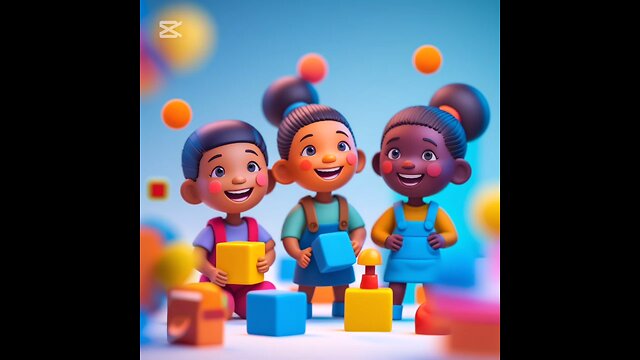Premium Only Content

children is a 🤽 playing 🙂
Children's play is a multifaceted activity that is essential to their development, encompassing physical, cognitive, social, and emotional growth. It can be broadly categorized into structured and unstructured forms.
Unstructured Play: Also known as free play, this type allows children to engage in spontaneous, self-directed activities without predefined rules or objectives. It fosters creativity, problem-solving skills, and emotional well-being. For instance, children might invent games, build structures with blocks, or engage in imaginative role-playing. Such activities enable them to explore their interests and develop autonomy.
Structured Play: In contrast, structured play involves activities with specific rules and goals, often guided by adults. This form of play can enhance learning in areas such as mathematics, literacy, and teamwork. Examples include board games, organized sports, or educational games that promote skill development within a defined framework.
The progression of children's play has been studied extensively. Mildred Parten's stages of play theory outlines six types:
1. Unoccupied Play: Children are not actively engaged in play, often observing their surroundings.
2. Solitary Play: Children play alone, focusing on their activities without interest in others.
3. Onlooker Play: Children watch others play, engaging in conversation about the activity without joining in.
4. Parallel Play: Children play adjacent to each other, mimicking actions but not directly interacting.
5. Associative Play: Children interact during play, sharing materials and ideas without a common goal.
6. Cooperative Play: Children play together with a shared goal, assigning roles and collaborating.
Understanding these stages helps caregivers and educators support appropriate play experiences that align with children's developmental stages.
Moreover, play serves as a vital medium for learning. Through play, children make sense of their world, develop language skills, and build social relationships. It acts as a bridge between their experiences and understanding, contributing significantly to brain development and learning.
In essence, children's play is a dynamic and integral component of their growth, providing a foundation for learning, social interChildren's play is a multifaceted activity that is essential to their development, encompassing physical, cognitive, social, and emotional growth. It can be broadly categorized into structured and unstructured forms.
Unstructured Play: Also known as free play, this type allows children to engage in spontaneous, self-directed activities without predefined rules or objectives. It fosters creativity, problem-solving skills, and emotional well-being. For instance, children might invent games, build structures with blocks, or engage in imaginative role-playing. Such activities enable them to explore their interests and develop autonomy.
Structured Play: In contrast, structured play involves activities with specific rules and goals, often guided by adults. This form of play can enhance learning in areas such as mathematics, literacy, and teamwork. Examples include board games, organized sports, or educational games that promote skill development within a defined framework.
The progression of children's play has been studied extensively. Mildred Parten's stages of play theory outlines six types:
1. Unoccupied Play: Children are not actively engaged in play, often observing their surroundings.
2. Solitary Play: Children play alone, focusing on their activities without interest in others.
3. Onlooker Play: Children watch others play, engaging in conversation about the activity without joining in.
4. Parallel Play: Children play adjacent to each other, mimicking actions but not directly interacting.
5. Associative Play: Children interact during play, sharing materials and ideas without a common goal.
6. Cooperative Play: Children play together with a shared goal, assigning roles and collaborating.
Understanding these stages helps caregivers and educators support appropriate play experiences that align with children's developmental stages.
Moreover, play serves as a vital medium for learning. Through play, children make sense of their world, develop language skills, and build social relationships. It acts as a bridge between their experiences and understanding, contributing significantly to brain development and learning.
In essence, children's play is a dynamic and integral component of their growth, providing a foundation for learning, social interaction, and emotional development.
action, and emotional development.
Children's play is a multifaceted activity that is essential to their development, encompassing physical, cognitive, social, and emotional growth. It can be broadly categorized into structured and unstructured forms.
Unstructured Play: Also known as free play, this type allows children to engage in spontaneous, self-directed activities without predefined rules or objectives. It fosters creativity, problem-solving skills, and emotional well-being. For instance, children might invent games, build structures with blocks, or engage in imaginative role-playing. Such activities enable them to explore their interests and develop autonomy.
Structured Play: In contrast, structured play involves activities with specific rules and goals, often guided by adults. This form of play can enhance learning in areas such as mathematics, literacy, and teamwork. Examples include board games, organized sports, or educational games that promote skill development within a defined framework.
The progression of children's play has been studied extensively. Mildred Parten's stages of play theory outlines six types:
1. Unoccupied Play: Children are not actively engaged in play, often observing their surroundings.
2. Solitary Play: Children play alone, focusing on their activities without interest in others.
3. Onlooker Play: Children watch others play, engaging in conversation about the activity without joining in.
4. Parallel Play: Children play adjacent to each other, mimicking actions but not directly interacting.
5. Associative Play: Children interact during play, sharing materials and ideas without a common goal.
6. Cooperative Play: Children play together with a shared goal, assigning roles and collaborating.
Understanding these stages helps caregivers and educators support appropriate play experiences that align with children's developmental stages.
Moreover, play serves as a vital medium for learning. Through play, children make sense of their world, develop language skills, and build social relationships. It acts as a bridge between their experiences and understanding, contributing significantly to brain development and learning.
In essence, children's play is a dynamic and integral component of their growth, providing a foundation for learning, social interaction, and emotional development.
Children's play is a multifaceted activity that is essential to their development, encompassing physical, cognitive, social, and emotional growth. It can be broadly categorized into structured and unstructured forms.
Unstructured Play: Also known as free play, this type allows children to engage in spontaneous, self-directed activities without predefined rules or objectives. It fosters creativity, problem-solving skills, and emotional well-being. For instance, children might invent games, build structures with blocks, or engage in imaginative role-playing. Such activities enable them to explore their interests and develop autonomy.
Structured Play: In contrast, structured play involves activities with specific rules and goals, often guided by adults. This form of play can enhance learning in areas such as mathematics, literacy, and teamwork. Examples include board games, organized sports, or educational games that promote skill development within a defined framework.
The progression of children's play has been studied extensively. Mildred Parten's stages of play theory outlines six types:
1. Unoccupied Play: Children are not actively engaged in play, often observing their surroundings.
2. Solitary Play: Children play alone, focusing on their activities without interest in others.
3. Onlooker Play: Children watch others play, engaging in conversation about the activity without joining in.
4. Parallel Play: Children play adjacent to each other, mimicking actions but not directly interacting.
5. Associative Play: Children interact during play, sharing materials and ideas without a common goal.
6. Cooperative Play: Children play together with a shared goal, assigning roles and collaborating.
Understanding these stages helps caregivers and educators support appropriate play experiences that align with children's developmental stages.
Moreover, play serves as a vital medium for learning. Through play, children make sense of their world, develop language skills, and build social relationships. It acts as a bridge between their experiences and understanding, contributing significantly to brain development and learning.
In essence, children's play is a dynamic and integral component of their growth, providing a foundation for learning, social interaction, and emotional development.
-
 1:04:12
1:04:12
Crypto Power Hour
12 hours ago $5.42 earnedSolana Treasury Strategy w/ Joseph Onorati, CEO, DeFi Dev. Corp.
20.8K7 -
 12:29
12:29
Clintonjaws
12 hours ago $10.83 earnedShane Gillis vs 'The View' - This Is Priceless!
10.5K7 -
 22:53
22:53
Jasmin Laine
18 hours agoCarney’s Speech BACKFIRES Spectacularly—Liberals PANIC on National TV
10.7K25 -
 1:38
1:38
Jeff Ahern
12 hours ago $2.11 earnedThe Mamdani Effect
10.2K2 -
 LIVE
LIVE
The Bubba Army
23 hours agoNBA BETTING SCANDAL! - Bubba the Love Sponge® Show | 10/24/25
764 watching -
 8:01
8:01
The Gun Collective
15 hours agoBEST new 2011 in 2025? -- Kimber 2K11 Pro Honest Review!
16.3K2 -
 8:49
8:49
Millionaire Mentor
18 hours agoMAGA Vet SHUTS DOWN AOC So Hard She LOST IT
14.7K29 -
 7:25
7:25
The Shannon Joy Show
17 hours agoWhat is the PRIME Act? With Rep. Thomas Massie
16.2K7 -
 24:17
24:17
The Official Corbett Report Rumble Channel
14 hours agoGates' Fake Meat Agenda Flops! - #NewWorldNextWeek
11.7K14 -
 34:08
34:08
Simply Bitcoin
1 day ago $2.48 earnedLiving Off Bitcoin: Solar Mining in a Trailer
10K